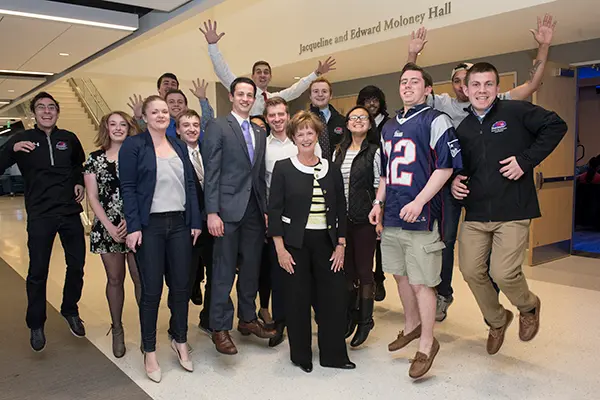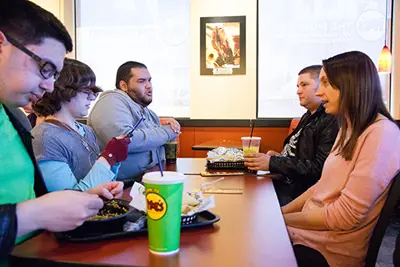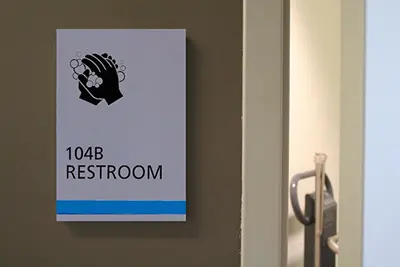Students, Leaders Tackle Issue in Latest Forum
 Image by Tory Germann
Image by Tory Germann
05/05/2016
By Sheila Eppolito
On a beautiful spring night on the cusp of finals season, more than 50 students filled the Jacqueline and Edward Moloney Ballroom at University Crossing to dine and discuss issues with the room’s namesake, Chancellor Jacquie Moloney.
Organized by the Student Government Association (SGA), the Chancellor’s Forum provides direct access to the chancellor and other key campus administrators. Students had the option of submitting questions ahead of time, or participating in an open-mic Q-and-A format.
Freshman exercise physiology major Michaela Lovett of Saugus learned about the event from her adviser, and attended for two reasons.
“First, I think it’s cool that our chancellor is a woman, and I wanted to meet her,” said Lovett. “I also am interested in learning more about how North and South Campus students can come together more.”
Moloney kicked off the evening by wishing the students well on their finals, then took questions that centered on the evening’s theme of inclusion on campus, an issue selected by the SGA.
“With race and gender becoming such hot button issues on so many college campuses around the country, it’s important to understand how UMass Lowell is promoting inclusion here,” said junior James Christopher, a political science major from Peabody and SGA’s president.
Moloney reminded attendees of the seriousness with which diversity and inclusion are considered at the university: One of the five pillars of the Strategic Plan is devoted to it. Additionally, she cited the university’s support for hundreds of student clubs and organizations, increasing staff for the Office of Multicultural Affairs, financial support for scholarships and international experiences and continued, open dialogue with student leaders to address concerns and identify opportunities.
“We all have a stake in making the university inclusive and diverse,” she said, “and a lot of credit for our significant increase in diversity among students goes to the student leaders in this room, who bring people together in clubs and through events and activities.”
According to Moloney, the university’s commitment, combined with SGA’s excellent student programming, has real results.
“Through ongoing discussions like these, the respect between administrators and students has helped UMass Lowell steer clear of the divisive and sometimes violent controversies over race and gender seen on other campuses,” Moloney said.
Luis Falcón, dean of the College of Fine Arts, Humanities and Social Sciences, told students that an inclusive campus depends on an environment where people can exchange ideas freely and respectfully.
“We have a challenge to ensure the education we’re providing reflects the values of the university,” said Falcón. “Students need to be able to debate and talk about issues important to them, and those things change all the time.”’
Falcón also said the university’s commitment to scholarships – in the U.S. and internationally – will continue to ensure diversity on campus.
Other student questions included:
Q. How can facilities upgrades support inclusiveness?
A. Peter Brigham, assistant director of planning, talked about the fast pace of facilities improvements over the past several years, with new, fully accessible buildings; remodeling old buildings to improve access; installation of elevators in Perry and Coburn Halls within three years, and creation of 40 gender-neutral bathrooms on campus.
Q. What can be done to close the gap between North and South Campuses?
A. Brigham said University Crossing has helped bridge the divide between campuses by serving as a central hub. He also talked about upcoming improvements along the river and to canal bridges, which will make the area more attractive, improve access for university buses and increase opportunities for walking and cycling around campus.
Q. How can the gender gap between male and female students be minimized?
A. Moloney said some of the gender gap comes from larger, societal disparities in STEM majors, which are still more heavily populated by males. “We’ve recently promoted Julie Chen to Vice Provost for Research, and we’ll continue to explore ways to welcome young women into the STEM fields,” she said.
Q. What other components are key to an inclusive campus?
A. Amy Liss, associate director of Student Activities and Leadership, said an inclusive college environment pays lifelong dividends for students.
“Inclusiveness creates a safe space where students can grow, become skilled in managing conflict and learn how to be welcoming and understanding,” said Liss. “These skills will help students navigate the world long after they leave the university.”
For the last question of the evening, Moloney was asked how she feels about being a woman at the head of the university.
“I love it, it’s a great privilege,” she said.
The crowd applauded its approval.




